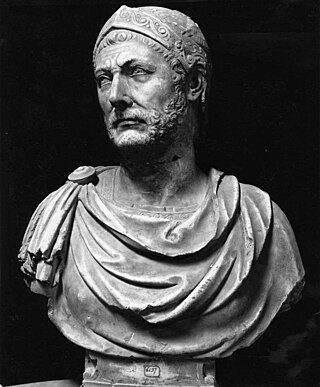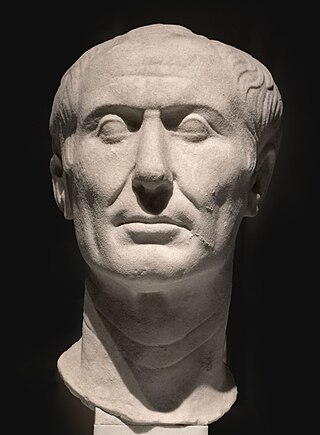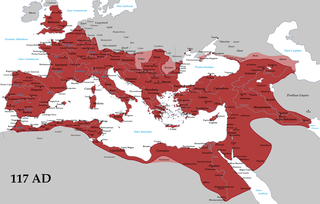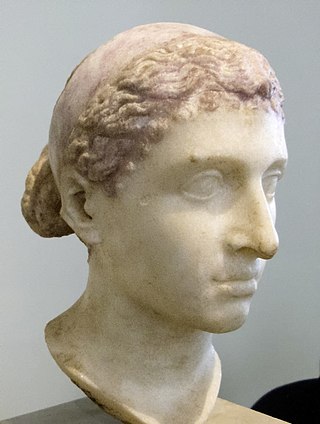This article relies largely or entirely on a single source .(November 2016) |
Limata was a Roman era city of Byzacena, in Roman North Africa. [1] It was home to the Bishop, Purpurius, one of the founders of Donatist Movement.
This article relies largely or entirely on a single source .(November 2016) |
Limata was a Roman era city of Byzacena, in Roman North Africa. [1] It was home to the Bishop, Purpurius, one of the founders of Donatist Movement.

Gaius Julius Caesar Augustus, also known as Octavian, was the founder of the Roman Empire. He reigned as the first Roman emperor from 27 BC until his death in AD 14. The reign of Augustus initiated an imperial cult, as well as an era of imperial peace in which the Roman world was largely free of armed conflict. The Principate system of government was established during his reign and lasted until the Crisis of the Third Century.

The Holy Roman Empire, also known as the Holy Roman Empire of the German Nation after 1512, was a polity in Central and Western Europe, usually headed by the Holy Roman Emperor. It developed in the Early Middle Ages and lasted for almost a thousand years until its dissolution in 1806 during the Napoleonic Wars.

Roman Britain was the territory that became the Roman province of Britannia after the Roman conquest of Britain, consisting of a large part of the island of Great Britain. The occupation lasted from AD 43 to AD 410.

Hannibal was a Carthaginian general and statesman who commanded the forces of Carthage in their battle against the Roman Republic during the Second Punic War.

Gaius Julius Caesar was a Roman general and statesman. A member of the First Triumvirate, Caesar led the Roman armies in the Gallic Wars before defeating his political rival Pompey in a civil war, and subsequently became dictator from 49 BC until his assassination in 44 BC. He played a critical role in the events that led to the demise of the Roman Republic and the rise of the Roman Empire.

Marcus Aurelius Antoninus was Roman emperor from 161 to 180 and a Stoic philosopher. He was a member of the Nerva–Antonine dynasty, the last of the rulers later known as the Five Good Emperors and the last emperor of the Pax Romana, an age of relative peace, calm, and stability for the Roman Empire lasting from 27 BC to 180 AD. He served as Roman consul in 140, 145, and 161.

Raymond Roman Thierry Polański is a French and Polish film director, producer, screenwriter, actor and convicted sex offender. He is the recipient of numerous accolades, including an Academy Award, two British Academy Film Awards, ten César Awards, two Golden Globe Awards, as well as the Golden Bear and a Palme d'Or.

Rome is the capital city of Italy. It is also the capital of the Lazio region, the centre of the Metropolitan City of Rome Capital, and a special comune (municipality) named Comune di Roma Capitale. With 2,860,009 residents in 1,285 km2 (496.1 sq mi), Rome is the country's most populated comune and the third most populous city in the European Union by population within city limits. The Metropolitan City of Rome, with a population of 4,355,725 residents, is the most populous metropolitan city in Italy. Its metropolitan area is the third-most populous within Italy. Rome is located in the central-western portion of the Italian Peninsula, within Lazio (Latium), along the shores of the Tiber Valley. Vatican City is an independent country inside the city boundaries of Rome, the only existing example of a country within a city. Rome is often referred to as the City of Seven Hills due to its geographic location, and also as the "Eternal City". Rome is generally considered to be the cradle of Western civilization and Western Christian culture, and the centre of the Catholic Church.

The Roman Empire ruled the Mediterranean and much of Europe, Western Asia and North Africa. The Romans conquered most of this during the Republic, and it was ruled by emperors following Octavian's assumption of effective sole rule in 27 BC. The western empire collapsed in 476 AD, but the eastern empire lasted until the fall of Constantinople in 1453.

Roman numerals are a numeral system that originated in ancient Rome and remained the usual way of writing numbers throughout Europe well into the Late Middle Ages. Numbers are written with combinations of letters from the Latin alphabet, each letter with a fixed integer value. Modern style uses only these seven:

The Roman Republic was the era of classical Roman civilization beginning with the overthrow of the Roman Kingdom and ending in 27 BC with the establishment of the Roman Empire following the War of Actium. During this period, Rome's control expanded from the city's immediate surroundings to hegemony over the entire Mediterranean world.

Hepburn romanization is the main system of romanization for the Japanese language. The system was originally published in 1867 by American Christian missionary and physician James Curtis Hepburn as the standard in the first edition of his Japanese–English dictionary. The system is distinct from other romanization methods in its use of English orthography to phonetically transcribe sounds: for example, the syllable is written as shi and is written as cha, reflecting their spellings in English.

The Holy Roman Emperor, originally and officially the Emperor of the Romans during the Middle Ages, and also known as the Romano-German Emperor since the early modern period, was the ruler and head of state of the Holy Roman Empire. The title was held in conjunction with the title of King of Italy from the 8th to the 16th century, and, almost without interruption, with the title of King of Germany throughout the 12th to 18th centuries.

Cleopatra VII Thea Philopator was Queen of the Ptolemaic Kingdom of Egypt from 51 to 30 BC, and its last active ruler. A member of the Ptolemaic dynasty, she was a descendant of its founder Ptolemy I Soter, a Macedonian Greek general and companion of Alexander the Great. Her first language was Koine Greek, and she is the only Ptolemaic ruler known to have learned the Egyptian language. After her death, Egypt became a province of the Roman Empire, marking the end of the last Hellenistic-period state in the Mediterranean, a period which had lasted since the reign of Alexander.

Classical antiquity, also known as the classical era, classical period, classical age, or simply antiquity, is the period of cultural European history between the 8th century BC and the 5th century AD comprising the interwoven civilizations of ancient Greece and ancient Rome known together as the Greco-Roman world, centered on the Mediterranean Basin. It is the period during which ancient Greece and ancient Rome flourished and had major influence throughout much of Europe, North Africa, and West Asia.

In modern historiography, the Western Roman Empire was the western provinces of the Roman Empire, collectively, during any period in which they were administered separately from the eastern provinces by a separate, independent imperial court. Particularly during the period from AD 395 to 476, there were separate, coequal courts dividing the governance of the empire into the Western provinces and the Eastern provinces with a distinct imperial succession in the separate courts. The terms Western Roman Empire and Eastern Roman Empire were coined in modern times to describe political entities that were de facto independent; contemporary Romans did not consider the Empire to have been split into two empires but viewed it as a single polity governed by two imperial courts for administrative expediency. The Western Empire collapsed in 476, and the Western imperial court in Ravenna disappeared by AD 554, at the end of Justinian's Gothic War.

In modern historiography, ancient Rome is the Roman civilisation from the founding of the Italian city of Rome in the 8th century BC to the collapse of the Western Roman Empire in the 5th century AD. It encompasses the Roman Kingdom, the Roman Republic, and the Roman Empire until the fall of the western empire.

The fall of the Western Roman Empire, also called the fall of the Roman Empire or the fall of Rome, was the loss of central political control in the Western Roman Empire, a process in which the Empire failed to enforce its rule, and its vast territory was divided between several successor polities. The Roman Empire lost the strengths that had allowed it to exercise effective control over its Western provinces; modern historians posit factors including the effectiveness and numbers of the army, the health and numbers of the Roman population, the strength of the economy, the competence of the emperors, the internal struggles for power, the religious changes of the period, and the efficiency of the civil administration. Increasing pressure from invading barbarians outside Roman culture also contributed greatly to the collapse. Climatic changes and both endemic and epidemic disease drove many of these immediate factors. The reasons for the collapse are major subjects of the historiography of the ancient world and they inform much modern discourse on state failure.

Leati Joseph "Joe" Anoaʻi, better known by his ring name Roman Reigns, is an American professional wrestler and former football player. As a wrestler, he has been signed to WWE since 2010, and currently performs on the SmackDown brand. He is the former leader of The Bloodline stable and a member of the Anoaʻi family. Reigns's title reign of 1,316 days as Undisputed WWE Universal Heavyweight Champion was the fourth-longest world title reign in WWE history and the longest championship reign since 1988.

The Byzantine Empire, also referred to as the Eastern Roman Empire, was the continuation of the Roman Empire centred in Constantinople during Late Antiquity and the Middle Ages. The eastern half of the Empire survived the conditions that caused the fall of the West in the 5th century AD, and continued to exist until the fall of Constantinople to the Ottoman Empire in 1453. During most of its existence, the empire remained the most powerful economic, cultural, and military force in the Mediterranean world. The term "Byzantine Empire" was only coined following the empire's demise; its citizens referred to the polity as the "Roman Empire" and to themselves as "Romans". Due to the imperial seat's move from Rome to Byzantium, the adoption of state Christianity, and the predominance of Greek instead of Latin, modern historians continue to make a distinction between the earlier Roman Empire and the later Byzantine Empire.